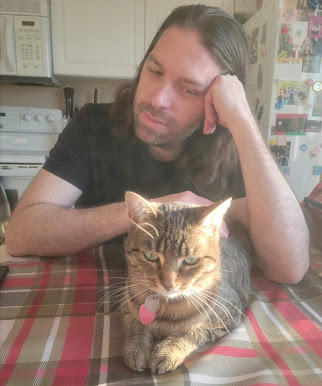Some lines are better than the poems they’re placed into. They outlast the meaning of the poems that belonged to a period (and we know it’s a period because it’s over) and no longer need to be shared. I’ve had a lot of lines like that. Especially as my style evolved, and as I first attempted, around 2010, to write poetry in English. Much of what I wrote then I’ve since rewritten in French – that project of a topobiography through the Prairies is still ongoing. I had kept the notebooks, and so many other notebooks, where poems sat, never copied, never published, where single lines wouldn’t amount to anything except being themselves.
I shouldn’t yell this out, but I just love being solicited for publications. I’m vain in that way – and unsure of myself, so I like being asked as opposed to trying a cold submission. I’ve never used Submittable and its very existence scares me. When rob mclennan reached out to see if I might have a chapbook in me (what was he expecting I wonder, after that first assembly of bilingual tweets? he seems rather open, entirely unstifling) I very much wanted to say yes. But I didn’t have the poems. So I went through everything I had typed up, everything I had thought about submitting. And I wasn’t really happy with much. But I found a lot of lines. So the idea emerged, slowly. What if I finally did something with all these lines? What could I salvage?
I copied the lines into a new notebook. One after the other. Then I moved through them, until there were none left. Some left the page by themselves and found brand new poems. Others joined together in transit. Others remained together; a decade having passed, they still belonged to one another. Others went their separate ways. As many moments I felt compelled to remember at the time – like the line about non-animal humans I wrote at the food court in the Sherwood Park Mall, one of the last time I saw my wife’s uncle alive. A kind of occasional poetry, poems separated from their occasions, transformed into autobiography and past-dredging.
I can’t tell how much of the poems were already written, how much is new. Some poems are brand new, written in between the rest. The central lines, the images, most of these are old. I brought myself back to several moments, much of it outside of the timelines I had focused on in my latest collection. So it completes it nicely, and in retrospect the tone is similar. It turns out that there’s a lot I was able to say about my past in the fall of 2021 that I could never quite reach in my earlier attempts. Perhaps it’s distance, or craft; perhaps it’s breaking my own imposed rule not to do coming of age stories; perhaps it’s writing in English. But in going through these lines, there’s a lot about death in the family, death of the family, and positioning myself toward the family I’ve been creating. Things I had tried to write about. Also, communists in Hull, Qc.
I owe the title to my grandmother Mariette. The cover picture was taken when I went for what I thought might be a last visit before her announced death (it was not, but it was the last time she appeared well). She was one of the first people to read the manuscript that became my first two books. It had snowed so much, that last spring snow, that large branches were breaking along the highway by Mattawa. Il va faire clair demain – literally, it’ll be bright tomorrow. A warning uttered in the evening. Taken out of context, like so many of the lines in the chapbook, a promise, a statement of hope.
Jérôme Melançon lives in oskana kâ-asastêki / Regina, SK. Tomorrow’s Going to Be Bright is his second chapbook with above/ground press, after Coup (2020). He often reviews for periodicities and his non-poetic work can easily be found through academic databases.

